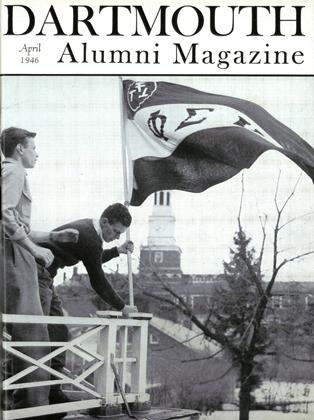WHILE the central feature of the prospective Dartmouth Center is its provision of an assembly hall, or auditorium, sufficiently large to seat the entire college and its guests on any official occasion—replacing Webster Hall, which has long been outgrown—the incidental feature (as now planned) is that of providing suitable quarters for the musical and dramatic arts, thus giving them a local habitation—and incidentally a name, of which much more has already been said.
That music and the drama deserve appropriate recognition as elements in our culture can hardly be denied. To write the great music of a nation is to help make its history. More trivial aspects of the theatre should not blind us to the great part played by dramatists, from the author of the Book of Job, through Aeschylus, Sophocles, Euripides, Aristophanes, Moliere and Shakespeare to the present day and to ages yet unborn, as elements in the development of human cultivation. In other words, music and the dramatic arts merit their shrine, along with books and the pictorial or plastic arts, since all serve the great end of forming the mind of man. Perhaps we are too prone to regard music and the theatre as elements contributing to man's amusement and diversion. They are more than that. They are one source of inspiration that makes a universal appeal, that is more than narrowly parochial, and that has helped to point the way to Heaven.
 View Full Issue
View Full Issue
More From This Issue
-
 Class Notes
Class Notes1918
April 1946 By ERNEST H. EARLEY, DONALD L. BARR -
 Article
ArticleLabor Marches With the Times
April 1946 By MALCOLM KEIR, -
 Article
ArticleTHE NEW CURRICULUM
April 1946 By PROF. HUGH S. MORRISON '26, -
 Class Notes
Class Notes1917
April 1946 By MOTT D. BROWN, DONALD BROOKS -
 Class Notes
Class Notes1911
April 1946 By NATHANIEL G. BURLEIGH, EDWIN R. KEELER -
 Article
ArticleEducational Aims
April 1946 By PROF. CHARLES LEONARD STONE '17
P. S. M.
-
 Article
ArticleHow Soft Are We?
December 1942 By P. S. M. -
 Article
ArticleThe Convenient Food
February 1943 By P. S. M. -
 Article
ArticleHow Good Is the Product?
May 1944 By P. S. M. -
 Article
ArticleAfter the War
February 1945 By P. S. M. -
 Article
ArticleLet Them Eat Spinach?
August 1945 By P. S. M. -
 Article
ArticleThe First Commandment
March 1946 By P. S. M.








